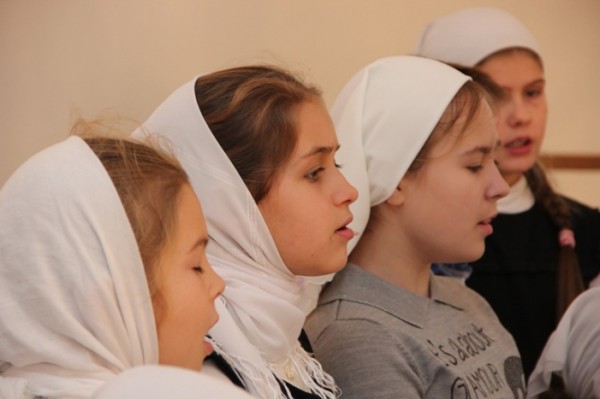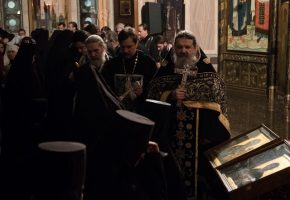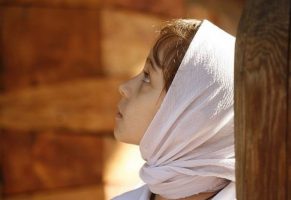One of the most powerful memories of growing up in our family which left a far-reaching impact on me was the practice we had of chanting the Troparion (hymn) of Pascha, Christos Anesti!, before dinner every night during the 40-day Paschal festal period.
Yes, if you can believe it, we chanted it three times every night at the dinner table. As a kid, sometimes it felt awkward and embarrassing. But my mother’s insistence on this repetitive practice proved to bear much fruit in the life of our family. Chanting Christ is Risen! brought the enduring, indestructible joy of the glorious Resurrection of our Lord into our home. It made the words of the hymn “Christ is Risen from the dead by death trampling down upon death and to those in the tombs He has granted LIFE!”; common knowledge and a kind of family creed.
The melody and text of the hymn were locked into our memories such that we were ready to chant it with heartfelt confidence at church and whenever needed – often when we would share our Orthodox faith with inquirers.
It proved to be a powerful prayer which invited our Lord Jesus Christ into the midst of our family as we gathered around our beautiful dinner table with thanksgiving. It marked out the season of Pascha as a time of joy that reset the focus of our life as a family.
In the midst of difficult struggles, we could chant this hymn as a prayer for help and a statement of faith and hope. It is as if this hymn–which proclaims the single most important fact of our faith that CHRIST IS RISEN!, which is the very reason we are Christians—became the “ison” of our life together and consequently the foundation of our identity as a family. Music, especially coupled with Truth, is very powerful.
Musically speaking, there are only two parts in Byzantine music—ison and melos. Melos (melody) takes the profound language of our hymnology and “clothes” it in kerygmatic melody so as to preach and proclaim the text.
The ison is the note that sets the mode (tone) and is “held” while the text of the verses and hymns are chanted by the melodist (or many melodists in a choir together). Ison is very difficult because it requires a singular, focused determination to be strong and stay in one place, tonally speaking, while the melodist is moving all around the scale.
The ison is often neglected because it is very difficult and perceived as unnecessary. But ison is essential to what is happening in Byzantine music. It is like a throne that provides a “seat” for the melody so that it does not lose its way and fall down. Ison is the framework for the melody, a non-negotiable aspect of Byzantine music.
Music is a profound anthropological phenomenon and a form of communication perhaps more basic than human speech.
Music is also a highly effective instrument for the cultivation and keeping of memory.
These ideas have been articulated by thoughtful people down through the ages (ancient philosophers, composers, musicians, and thinkers) and today are confirmed by the inclinations of modern science. But the unbroken Tradition and experience of the Orthodox Church in worship for the past 2,000-plus years is perhaps the greatest of all proofs.
Consider the fact that the essential entirety of Orthodox theology is kept, proclaimed, and realized in its worship, comprised of the Divine Services and Holy Mysteries whose content are word-filled hymns and prayers.
Next, consider that approximately 90 percent of those worshipful words are “clothed with the garment of melody” (Gregorios Stathis, The Divine Music Project), that is, the words of these prayers and hymns are intoned and melodiously chanted (by the priest, cantors, faithful, and all the people) without accompaniment.
When we consider these two realities together, what emerges is the profound and central role of music (melody and hymnology) in Orthodox Christian worship and theology, as well as in the Church’s vocation as proclaimer and keeper of the Gospel of our Lord, God, and Savior, Jesus Christ. The symbiotic relationship between worship (leitourgia), music, and theology has always been an organic aspect of the Orthodox way of being Christian.
It is foundational to the very ethos of Orthodoxy. As we chant, we are doing the work of theology, we are doing the work of prayer, and we are keeping the memory and reality of the Life-saving Death and Resurrection of our Lord Jesus Christ.
One may be asking the following question at this point in the article: Isn’t Byzantine music and the hymnology of our Church the concern of cantors, choirs, and the priest?
The short answer to these questions is absolutely not. Since the hymns for our Church hold the very content of our faith and constitute so much of our liturgical and prayer life together, keeping this tradition is the vocation of ALL the faithful. The hymns are practical and accessible for all—“simple” enough for children to participate and “complex” enough to be boundless in musical and poetic beauty. But in order to attempt a deeper answer to that question, allow me to ask you, the reader, a question: What is the most important gift we can give to our children? Please take a moment to think about that before you continue to read. Allow me to submit to you that the very best gift we can give our children is Christ Himself and His Church, the Gospel, the Good News that God’s love for mankind is real and it makes us who we are. Like the ison, giving this gift is very difficult and in the world, it is often passed off as unnecessary. But every human being needs the ison, something or someone that helps us know where we were and where we are going.
The good news is that God desires to have communion with us, to have a relationship with us, to save us, and to have us with Him in His eternal Kingdom forever. Christ is our ison.
The best gift we can give our children is the ison: the personal knowledge and experience of the true story worth basing our lives on that through the Cross, joy has come into all the world.
Christ destroyed the power of death, sin, and the evil one, and we have been given new life—eternal Life! This is why we are Christians! Taking the name “Christian” means that this cosmic truth is our reality. We live by this story, and chant it, because we believe it is true!
We can give this gift to our children by letting Christ and the Church be the “ison” of our life. There are many ways to do this as a family. One simple yet very powerful way is by learning the hymns of the Church and chanting them together at home, perhaps as a prayer before dinner or at morning or evening prayers.
This brings Christ and the Church into our home and puts them at the center. It allows the enduring hymns of our faith to have “air-time” to powerfully proclaim the love and peace of Christ. Chanting the hymns of the Church as a family also allows Christ and the story of our salvation to be the “ison” amidst the cacophony of other messages and melodies in the world, literally or figuratively speaking. What is more, when we chant the hymns of the Church together, we become bearers of the precious, boundless tradition of our Church centered on Christ and His glorious Life-Saving Passion and Resurrection. We become the ison in and for the world.
(This article is adapted from a presentation given at the Greek Orthodox Metropolis of Boston Lenten Family Camp in Contoocook, N.H. on March 1.)
Christina T. Stavros, M.Div. is a 2014graduate of Holy Cross School of Theology(Certificate in Byzantine Music) and holds a B.A. in Religion from Hope College (Holland,Mich.) and a Masters of Divinity from Regent College (Vancouver, Canada).

















